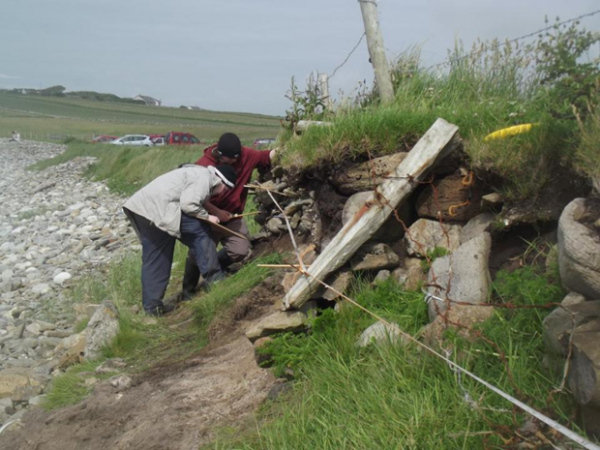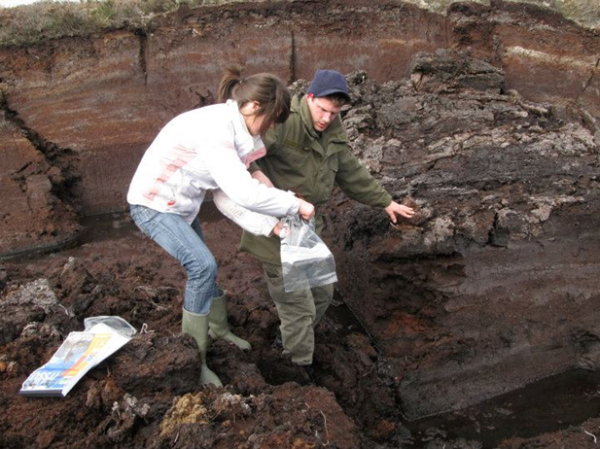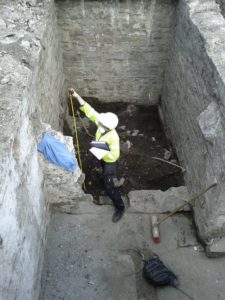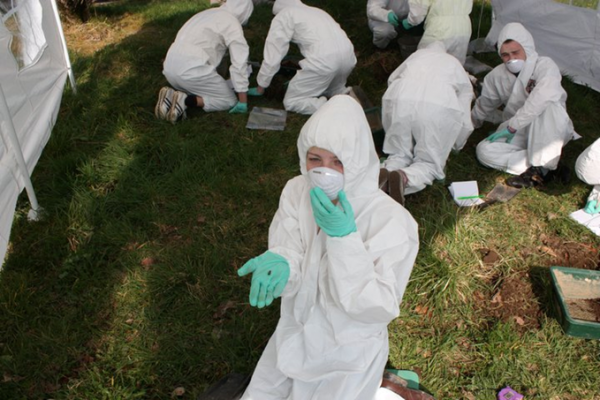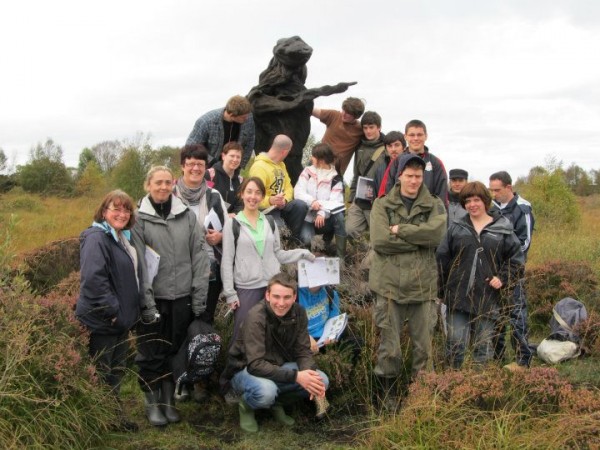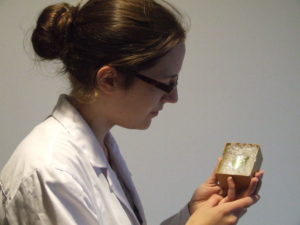We think we have the best archaeology courses in Ireland, but don’t just take our word for it – hear what others have to say! Here is one example of the comments below: “On my first commercial dig alone of the 15 archaeologists on site, 8 were IT Sligo graduates. On my most recent dig in Wales of the 10 archaeologists, 4 were IT Sligo. For anyone who is considering a career in archaeology, IT Sligo should be the first port of call.” (Aidan Keogh, graduated 2014)
- Commercial Excavation Director – Jean O’Dowd, Archaeologist
- External Examiner 2012-15 – Dr Chris Hunt, Liverpool John Moores University
- Graduate 2008 – Ana Filipa Castanheira Santos
- Graduate 2008 – Marese Curtin
- Graduate 2013 – William O’Siorain
- Graduate 2014 – Aidan Keogh
- Graduate 2014 – Robert Breen
- MSc Graduate 2015, Graduate 2012 – Sinead Middleton
Why not check out the full details of our 2 year Level 6 Higher Certificate, 3 year Level 7 BSc degree and 4 year Level 8 BSc Honours degrees.
.
Commercial Excavation Director – Jean O’Dowd
I have had the absolute pleasure of working in the field with graduates from IT Sligo’s Applied Archaeology programme on numerous occasions. It is instantly recognisable that these graduates have practical skills and training that is miles ahead of the norm. Their knowledge, skills and attitude set them in a league of their own.
.
Extracts from the report of our External Examiner for 2012-15 – Dr Chris Hunt (Liverpool John Moores University)
It has been a real pleasure to come to Sligo IT to externally examine this excellent degree.
Standards on the course are high, the teaching of excellent quality, enabling the vast majority of students to reach their true academic potential.
The BSc Applied Archaeology course is unique in the Island of Ireland, since unlike the courses in the larger institutions, it is highly targeted to producing able practitioners fully equipped to progress to demanding graduate-level jobs in archaeological consultancies and regulatory bodies. It is notable that the course routinely provides outstanding training in practical skills that students in the larger universities only read about – and have to acquire after graduation.
The emphasis on practical teaching has been maintained at Sligo without sacrificing academic quality and rigour, as witnessed by the relatively substantial number of graduates who have progressed successfully to higher degrees.
I warmly commend the staff for providing a well-rounded and distinctive education which presents outstanding opportunities for IT Sligo graduates.
.
Graduate 2008 – Ana Filipa Castanheira Santos
As an art student, I was always interested in the evolution of our cognitive and creative senses and, even though, I knew very little of archaeology, I always loved the evolution of “art”. So I ended up going to IT Sligo for the BSc in Applied Archaeology in 2004.
Being Portuguese it was hard at the beginning as I was in a town that I never heard of before where people spoke with odd accents, had tea constantly and dinner at, what to me was, snack time hours. But I quickly made friends in the class who helped me a lot adjusting to this new life. Our training excavation at Kilteasheen was one of the best experiences I ever had and it made me realise that this was the life for me so I was even more determined to learn and finish the course. At that time, Ireland’s economy was booming so after this excavation experience, my class got archaeology jobs for the remainder of the summer months and that continued until we finished our course.
The science part of the Applied Archaeology was the most difficult for me. As said before, I was an art student, so studying science subjects in English was a big struggle. Thankfully, I got really interested in the Bio molecular class, which made the rest of the science classes easier. I completed the course in 2008 and I was ready for the “real world”.
Unfortunately, it was the year that Ireland started its economical crisis. Work became sparse and so I applied for a scholarship to do a Masters degree in Portugal and got into Universidade do Minho, in the North of Portugal. My thesis focused on Rock Art and Landscape of a coastal area of Portugal. After recording and excavating on the field adjacent to the outcrop, I uncovered 1170 engravings. It took three years to finish this project, ending the Masters with grade A.
I got various archaeology jobs, including supervising training excavations at the university. However, Portugal went through the same thing as Ireland but hasn’t bounced back yet, so work was sparse but things are improving. I had previously helped organise the IT Sligo ‘Stones and Bones’ Archaeology Society tour to the north of Portugal, I realised that there was a future for me combining Archaeology and Tourism here, and so that’s my next goal. I am currently setting up my own Archaeology and Tourism Company. Hopefully, by 2016 I will be able to show visitors around sites from the Palaeolithic up to High Medieval and the Discovery Era.
The Applied Archaeology course not only taught me Archaeology and Science, it also taught me to not be afraid of new experiences and not to be afraid of taking chances.
.
Graduate 2008 – Marese Curtin
I graduated from the Level 8 Applied Archaeology B.Sc. in 2008. Most colleges will offer archaeology as part of an arts degree but when I left school I was looking some something more science based with a big emphasis on practical experience and I was not disappointed by the course in Sligo, at the time it was the only BSc in Archaeology available in Ireland. In addition to general archaeological topics, the course offered an in depth look at Irish archaeology from an academic and excavation perspective, a good mix of theory and practice for various subjects as well as modules in the usual specialisms such as environmental archaeology, zooarchaeology and osteology, GIS, surveying and conservation. Our training dig in first year was an eye opener, and as part of our ongoing training requirements, I managed to get commercial excavation work for three full summers while in college. I felt that by graduation we had been given an excellent theoretical and practical grounding in archaeology, as well as a realistic expectation of what it was like to operate in both the academic or commercial spheres of the sector.
I have spent my career to date in the commercial sector and I completed a MSc in Bioarchaeology in the University of York in 2011, specialising in human and animal remains. I’ve worked for 10 different companies on a variety of project types. So far I’ve worked on some very interesting sites, met some wonderful people and seen a lot of the countryside. Unfortunately, because archaeology is largely dependent on construction, the recession hit the sector very hard resulting in fewer jobs, the reduction of wages and grades and fewer opportunities for promotion.
In 2013 following advice from a colleague I got involved in a working group sanctioned by the IAI to look at wages and conditions in Irish archaeology and through that, I got involved in the effort to unionise. Some of the individuals in that group had been working for a very long time to organise people in archaeology they have done amazing work to date and it is great to have been a small part of that, I have been a rep and Equality officer and I am currently the rep for Ulster. Unite’s Archaeological Branch has been active since 2014 and has had a massive effect on wages and conditions in the sector. The branch has successfully established the Living wage as the starting rate for archaeologists and is currently seeking to establish a REA (Registered employment agreement) to provide legal protection for wages and conditions. The majority of employers in the sector are happy to work with the union but we still have a small number holding out so our work is not done yet. Currently I am still involved in the union and doing specialist reports, but I am taking a year out from excavation work.
.
Graduate 2013 – William O’Siorain
Since graduating from Sligo I have been involved in commercial archaeology and have worked with several companies. I am currently a full time employee of Archaeological Consultancy Services Unit and have been since April 2015.
The four years I spent studying applied archaeology in IT Sligo were four fantastic years. IT Sligo is a tightly knit community of students both young and mature. The Applied Archaeology course was a great choice for me as it involved so many aspects of a single subject I felt very passionately for. One of the key factors was the amount of outdoor work and activities involved with the course. From surveying passage tombs in Carrowkeel to investigating castles and post-medieval forts, this course has it all. The classes are small and personal with lecturers very eager and keen to teach their students. The hours are flexible allowing students time to enjoy college life, work on their assignments and partake in various clubs and societies IT Sligo has to offer.
As a graduate working in archaeology, I know from experience that this course is not only the best equipped in Ireland for working in commercial archaeology but it also prepares its students for the reality of the working world in archaeology. If your intention is to work in archaeology in Ireland, this course is the one for you. All of my employers would agree, IT Sligo produces the best site assistants in Ireland.
.
Graduate 2014 – Aidan Keogh
My time studying archaeology in IT Sligo was perhaps one of the best experiences of my life. I thoroughly enjoyed my four years in Sligo and the friends I have made have become some of my closest. The college itself is a very modern campus with excellent facilities and first class labs. All of the staff are always on hand to offer their help and experience. Their enthusiasm and love for their job is clearly seen in the work and effort they put into each and every student. The course itself is very well tailored for anyone who is hoping to gain a job in commercial archaeology. I have met more graduates of IT Sligo on site than from any other college and Sligo is known for producing competent and hardworking archaeologists. On my first commercial dig alone of the 15 archaeologists on site, 8 were IT Sligo graduates. On my most recent dig in Wales of the 10 archaeologists, 4 were IT Sligo. For anyone who is considering a career in archaeology, IT Sligo should be the first port of call.
.
Graduate 2014 – Robert Breen
The BSc course for Applied Archaeology in IT Sligo was exactly what I was looking for. I have been working as an archaeologist for about a year and a half since I graduated in 2014. From the start of my career I’ve always felt prepared and competent with all aspects of field work and excavation methods alike. The practical skills I learned, as well as the academic knowledge I gained from the enthusiastic lecturers, gave me lots of confidence to pursue the successful career I now have as an archaeologist.
I had no hesitation moving from Dublin to spend four years in Sligo. I knew it was the only place I would receive not only superb academic teaching but also plenty of hands-on practical experience, which I have benefited from immensely. Practicals in landscape surveying, excavation, osteoarchaeology, post-excavation methods as well as many others in the applied science modules meant that we were equipped for any field of interest we wished to pursue towards the end of the course. Students also had the opportunity of utilising and learning from the archaeological department’s large assemblage of high quality replicas which were always on hand as invaluable learning tools. The relatively small class size, in comparison to some of the larger university courses also made for an overall more intimate and enjoyable experience among friends and faculty alike. We as a class could truly benefit from a more focused environment during the many practical modules.
For my final year thesis I was encouraged to undertake a relatively large geophysical survey on a site of particular interest to me. This was something I hadn’t a clue about prior to starting the course. For this I am grateful to the very accommodating staff and plentiful supply of academic resources, and the help of my fellow students. I graduated in 2014, and have since been employed by many archaeological companies across the country. I have taken part in large excavations, road testing projects and a monument survey of an Early Medieval souterrain which I carried out with a fellow IT Sligo graduate from the year ahead of me. From my own experience it seems clear that the BSc degree in Applied Archaeology in IT Sligo is nationally renowned among my many colleagues as the best hands on practical archaeology course in the country. Once completed you are fully prepared to exit the classroom and enter the field. In addition to all of the above, Sligo’s dense archaeological heritage makes it without a doubt the best positioned archaeology course in the country!
.
MSc Graduate 2015, Graduate 2012 – Sinead Middleton
The varied and interesting modules, including forensic archaeology, zooarchaeology and archaeological surveying, gave me a thorough grounding in the practical skills and knowledge of archaeological work in Ireland. At the same time, I was encouraged to pursue areas I had a particular interest in which led me to undertake research into scientific analysis of archaeological glass for my final year thesis. Studying archaeology at IT Sligo for me meant getting the best possible education for my chosen career in an inclusive, friendly and encouraging atmosphere. There were also many opportunities to further my knowledge and experience outside of the classroom, whether taking part in archaeological excavations or field trips, attending archaeological conferences which are regularly held in IT Sligo or participating in the archaeological society activities. At all times, I could rely on the support of my fellow archaeology students and the guidance of IT Sligo’s experienced archaeology lecturers, many of whom are actively involved in archaeological research and excavations.
The knowledge I gained from my undergraduate degree allowed me to progress directly into postgraduate studies, continuing on with my research into glass material from archaeological sites. I graduated with a MSc by research in 2015 and have since gone on to full-time employment.

